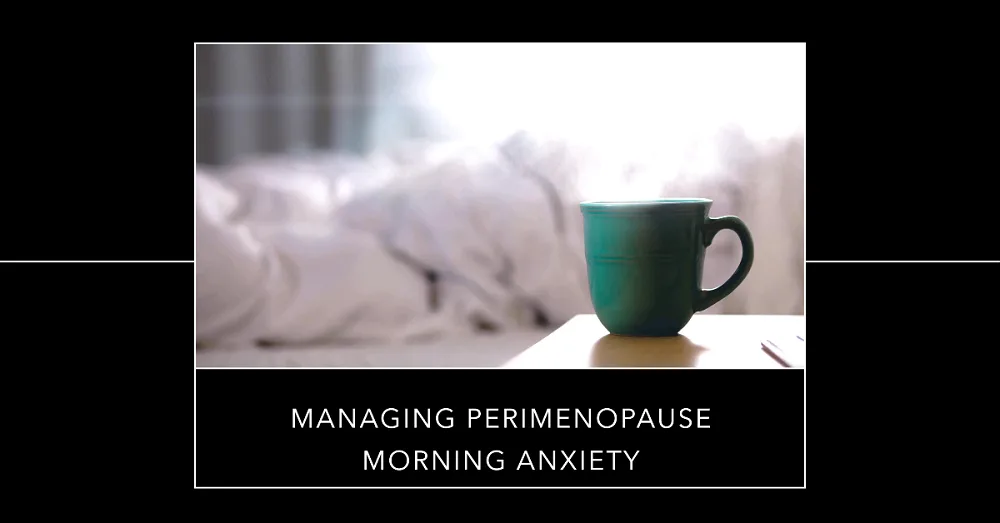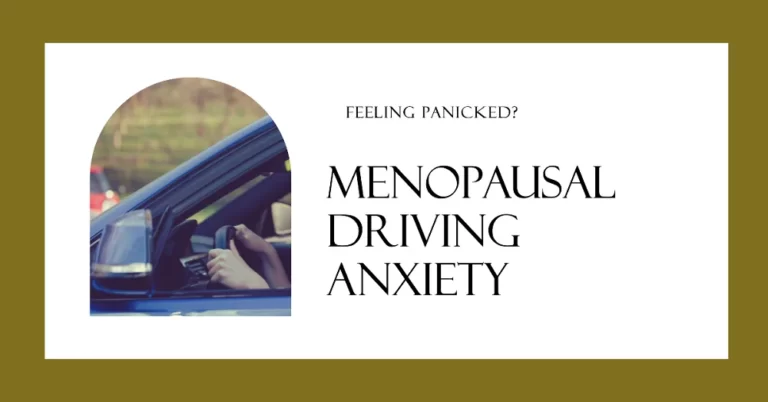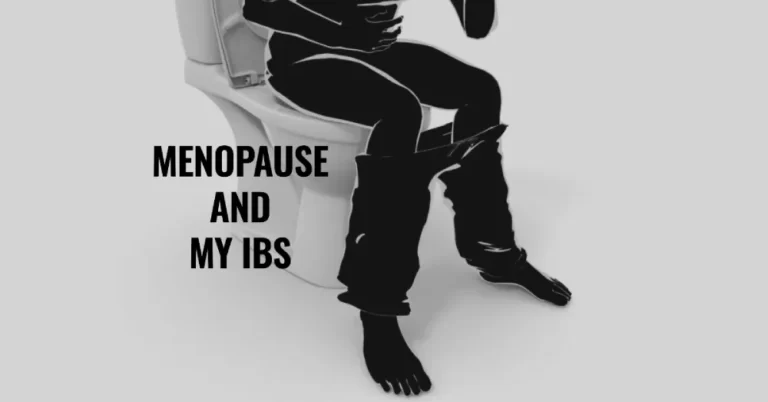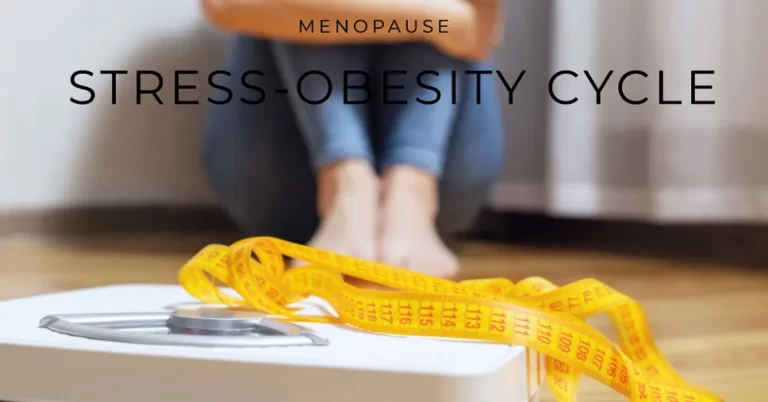How to Manage Perimenopause Morning Anxiety? Feel Healthy Aging without Worry
Perimenopause can be a tough time for many women, often leaving them feeling overwhelmed or anxious before their day has even begun. With fluctuating hormone levels and the associated symptoms of perimenopause, morning anxiety can be a real struggle that presents itself daily.
There is still hope, of course.
It’s important to be proactive in managing this symptom, and there are many effective strategies you can use to reduce stress levels and stay calm in the face of hormonal fluctuations. Stress reduction, regular exercise, getting enough sleep, eating a balanced diet, and avoiding caffeine may relieve these symptoms.
Focusing on relaxation techniques such as deep breathing exercises and mindfulness meditation can help you stay calm and focused during stress. It is possible to have a healthy aging process without worry by understanding the causes and effects of perimenopause morning anxiety and managing it holistically.
We’ll explore these techniques in more detail in this article and provide expert tips on tackling this issue head-on so that you can live your life to the fullest.
What is Perimenopause Anxiety Like?
Perimenopause Climacteric Syndrome (PCS) is when the physical and emotional symptoms of menopause start to appear. These symptoms are thought to be caused by a hormonal imbalance as the body adjusts to lower estrogen levels. One symptom that can affect many women during this time is increased anxiety first thing in the morning.

Perimenopause anxiety can be experienced differently from person to person; however, it often results in feeling overwhelmed, out of control, or always on edge. It may also manifest as worry or fear about the future and what is going on around us.
For example, some women may experience persistent worries about their health or the health of their loved ones during this time. Additionally, many women experience more general feelings of dread for no apparent reason during perimenopause anxiety.
This anxiety can be difficult to manage as it can hit suddenly and without warning, causing feelings of fear and panic. It is important to know that this feeling of anxiousness is completely irrational, yet it persists despite our best efforts.
As the world moves into an unprecedented era of turmoil, with the pandemic leaving many feeling exhausted, stressed, and overwhelmed, women in their perimenopause can be particularly vulnerable to morning anxiety. It’s important to be aware of the signs and symptoms, both physical and emotional so that you can work to manage them effectively.
How Morning Anxiety Is Related To Perimenopause?
During perimenopause, hormone levels fluctuate, causing cortisol levels to spike in the morning. Normally estrogen helps manage this spike in cortisol. Still, as estrogen levels decrease during perimenopause, more cortisol is present, which can overwhelm your nervous system in the morning and lead to anxiety or tension.
Women undergo hormonal changes that can impact their physical, psychological, and emotional health. These hormonal fluctuations can increase stress and anxiety, especially in the morning.
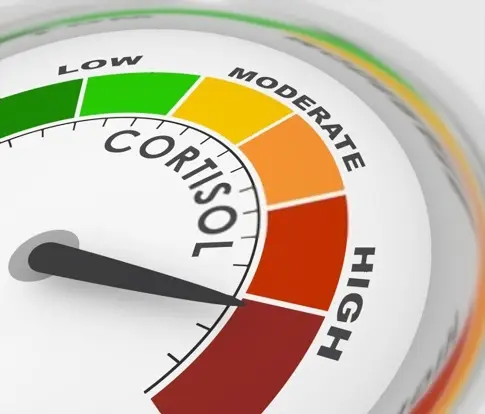
How Does It Affect Women?
Morning anxiety can cause various reactions that are different for each individual. Still, some common symptoms include feeling tense or on edge, irritability, mood swings, difficulty concentrating or staying focused, a rapid heartbeat or palpitations, headaches, and stomachaches.
Fatigue, foggy brains, tense muscles, and sleep disturbances are also due to heightened morning alertness. Let’s talk more about these symptoms and how to deal with them.
Irritability and Confusion
It’s common for perimenopause morning anxiety to make you irritable and confused. It’s often triggered by hormonal fluctuations due to estrogen and progesterone levels at this stage of life.
You may feel more frustrated or impatient with certain situations or people during this time. Women’s emotions may be triggered more easily, and mood swings are more common.
A spike in cortisol makes the body constantly alert, resulting in fatigue. This increases levels of cortisol in the body, leading to a sensation of racing heartbeats or chest tightness, sweating, confusion, and fuzzy thinking.
This heightened sense of alertness may lead to difficulty sleeping, which can cause exhaustion during the day.
Mood Swings
Mood swings are another perimenopause anxiety symptom. They may be caused by hormonal changes in the body or other factors such as stress or lack of sleep. For no apparent reason, women can feel happy one minute, then overwhelmed or sad the next.
Women may also experience anger or irritability as their body adjusts to changing hormone levels. Each symptom triggers the other, creating a vicious cycle of anxiety and difficulty managing emotions.
Foggy Brain
Foggy brain is an umbrella term used to describe forgetfulness or difficulty concentrating that often accompanies perimenopause anxiety, particularly if an underlying hormone imbalance is present.
Women may also have trouble focusing and concentrating. These cognitive issues can interfere with daily functioning at work or home and frustrate women accustomed to high functioning.
Tense Muscles
Perimenopausal anxiety is often accompanied by tense muscles around the neck, shoulders, and back. The primary cause of tense muscles is increased stress hormones released during perimenopause.
A fight-or-flight reaction is triggered, increasing muscle tension between itself and protecting itself. Muscle tension can negatively affect the body, including pain and stiffness in the affected areas, decreased range of motion, headaches, and difficulty sleeping.
Having muscle tension for too long can be uncomfortable and painful, so you should manage it as soon as possible.
Sleep Disturbances
As women transition through perimenopause and into menopause, their hormones shift dramatically. This leads to an imbalance that can disrupt the body’s natural oscillation rhythm between wakefulness and sleepiness, known as the “sleep-wake cycle.”
As a result of this disruption, many women experience difficulty falling asleep or staying asleep for long periods throughout the night, resulting in many sleepless nights and fatigue during the day.
The effects of sleep disturbances on a person’s daily life can include fatigue, irritability, difficulty concentrating, and decreased cognitive function. These issues are caused by a lack of restful sleep, essential for proper functioning.
Additionally, people who experience long-term sleep disturbances may be at increased risk for certain medical conditions such as high blood pressure and diabetes.
Headaches/Stomachaches
When a woman feels anxious or overwhelmed, tension builds up in her body, causing headaches. In addition to tension headaches, women may also experience migraines due to perimenopausal anxiety.
Some also report frequent stress headaches during this period, caused by chronic stress and exhaustion from coping with the many changes within the body.
Stomachaches: Alongside headaches, stomachaches are another symptom of perimenopause-related anxiety. This is because when our bodies experience high levels of stress or fear, it can increase our digestive activity. This leads to cramps, bloating, and pain in the abdominal area.
Many women also report experiencing nausea and vomiting as part of their perimenopausal anxiety symptoms. While these unpleasant and uncomfortable symptoms are usually not alarming unless they become severe or persistent over time.
Management Tools Coping with Perimenopause Anxiety
It is best to try and manage the symptoms of perimenopause anxiety before they become too severe. We want you to know that you are not alone in this journey, and plenty of resources are available to help you manage your perimenopause anxiety.
Let’s start by looking at some of the tools and techniques you can use to cope with symptoms.
Take Time for Self-Care

- Making time for yourself is essential in managing perimenopause morning anxiety. This includes taking a break from the hustle and bustle of everyday life to focus on activities that make you feel better.
- Whether reading a book, listening to music, baking a cake, taking a warm bath, or going for a walk in nature, taking time out of your day to focus on yourself will help you relax and reduce the stressors causing your anxiety.
- To manage the feelings of irritability and confusion, make sure to take time for yourself during the day; set aside even 10-15 minutes to relax and refocus your thoughts. Just do what you need to do to make yourself feel calm and balanced.
Start Your Day with Exercise for Minimizing Morning Stress

- Managing perimenopause morning anxiety can be easier with regular exercise. It can reduce stress and anxiety levels and improve overall mental health. Not only does it release endorphins which can improve mood, but it can also help regulate the hormones that are out of balance at this time.
- You can start your day with a brisk walk or jog, yoga, or any other form of physical activity you enjoy. It can tremendously help to manage symptoms of perimenopause-induced anxiety and help reduce tense muscles by calming the body’s fight-or-flight response.
- Massage therapy, warm baths, stretching, and foam rolling are good ways to alleviate muscle tension.
- Exercise can also improve the quality of sleep, which can help reduce anxiety levels.
Maintain a Balanced Diet
What should You Eat?
Maintaining a balanced diet is crucial for managing perimenopause morning anxiety. What you eat can significantly impact your mood and energy levels, so making healthy food choices is essential.

- One of the most important things you can do is ensure you get enough nutrients in your diet. This means eating plenty of fruits, vegetables, whole grains, and lean protein sources. These foods give your body the vitamins and minerals needed to function properly.
- Including fats from sources like avocados, olive oil, and fish can be beneficial for hormone balance. Foods rich in omega-3 fatty acids, such as salmon and walnuts, can also help reduce inflammation which can help manage anxiety.
- It’s also important to avoid processed foods and sugary snacks as much as possible. These types of foods can cause blood sugar spikes and crashes, which can lead to feelings of anxiety and irritability.
- Try to brighten up your meals by including colorful foods like fruits and vegetables or adding herbs and spices to give a nice flavor. This can help make eating more enjoyable, reduce anxiety related to food, and lift up your mood.
- Finally, staying hydrated is crucial for maintaining good mental health. Ensure you drink plenty of water throughout the day and avoid sugary drinks like soda or energy drinks.
When to Eat?
In addition to choosing healthy foods, paying attention to when you eat is essential. Regular meals can help stabilize your blood sugar levels and prevent mood swings.

If you’re feeling particularly anxious at certain times of the day, try eating something healthy to see if it helps. Some people find that eating a healthy snack before bed can help reduce feelings of anxiousness in the morning.
Eating regularly throughout the day is also important, ensuring you get enough calories to maintain your energy levels. Skipping meals or not eating enough can leave you tired and lethargic, worsening anxiety.
Relaxation Techniques Practice Mindfulness and Meditation
- Meditation/relaxation techniques: mindfulness meditation and deep breathing exercises can help to reduce stress and anxiety. Mindfulness and meditation can help you relax, calm your mind and reduce anxiety.
You can begin by setting aside a few minutes each morning to practice mindfulness and meditation. Focus on your breathing; if your mind wanders, gently bring it back to the present moment.

- A cup of herbal tea: A cup of herbal tea can help to relax the body and reduce anxiety. Herbal teas such as chamomile, lavender, and passionflower are known for their calming effects. Enjoy a cup of warm tea in the morning to help you feel relaxed and ready to tackle the day.
- Yoga or tai chi: Moving your body and relaxing your mind can be great with yoga or tai chi. You can practice yoga or tai chi in your home or take a class at a local studio.
Many people find that these activities help reduce stress, improve energy levels, and boost mood.
- Spending time in nature: Spending time outside in nature can be calming and therapeutic for the mind.
- Journaling: Writing down your thoughts and feelings can be a great way to release any emotions that may be causing stress or anxiety.
- Talk therapy: Talk therapy can be an effective tool in managing perimenopause morning anxiety. Talking to a professional therapist can help you process your feelings and develop coping strategies for dealing with anxiety.
Get Enough Sleep
- A good night’s sleep is essential for maintaining good mental health. Lack of sleep can exacerbate anxiety and make the symptoms of perimenopause more severe.
- You may find it helpful to establish a bedtime routine to promote good sleep habits. Avoid using electronic devices before bedtime, and create a calming atmosphere in your bedroom to promote relaxation.
- Avoiding caffeine late in the day, turning off screens at least an hour before bedtime, having a comfortable sleeping environment, and avoiding alcohol before bed can all help you get a better night’s sleep.
- Commit to getting at least seven to eight hours of sleep each night. This will help keep your body and mind well-rested and reduce feelings of anxiety.
Supplementation
- Certain supplements, such as magnesium and omega-3 fatty acids, help manage perimenopause morning anxiety.
- Some herbal supplements, such as passionflower and ashwagandha, may also be beneficial. Talk to your healthcare provider before taking supplements to ensure they are safe.
- Ashwagandha is an herbal supplement made from the root of Withania somnifera, a plant native to India and North Africa. It has been used in Ayurvedic medicine for centuries to help treat anxiety, stress, and insomnia. Studies have found that Ashwagandha may help reduce cortisol levels, which can help reduce anxiety symptoms.
- Magnesium is an essential mineral that plays a role in many bodily functions, including muscle and nerve functions. Low levels of magnesium can cause feelings of anxiety, so it may be beneficial to add a supplement to your diet.
Omega-3 fatty acids are found in fish, nuts, and certain oils. They are thought to have anti-inflammatory and antidepressant effects, which can help reduce anxiety.
Seek Support
It is important to seek support from friends, family, or even a mental health professional if your anxiety levels are too much to handle. Joining a support group can also be helpful as you may find others going through the same challenges.
Talking about your feelings and experiences can help relieve anxiety and prevent feelings of isolation.
When to Seek Professional Help for Morning Anxiety During Perimenopause?
During perimenopause, it is natural to feel overwhelmed due to the numerous changes occurring within the body. As women cope with new emotions and physical issues related to the condition, they might feel helpless.
This is normal during perimenopause and probably only temporary. Some women can handle things on their own, but others need help.
How do you tell when it’s time for professional help with morning anxiety?
Everyone’s perimenopause experience is different, and there’s no one-size-fits-all answer. However, it may be time to seek professional help if morning anxiety impacts your daily life.
Several types of professionals can provide support for managing perimenopause-related morning anxiety. Your primary care physician or gynecologist can offer guidance on lifestyle changes and medical treatment options that may help alleviate your symptoms.
Additionally, mental health professionals such as therapists or psychiatrists can provide counseling or prescribe medication if needed. It’s important to remember that seeking professional help is not a sign of weakness; it takes strength and courage to acknowledge when you need additional support and improve your quality of life.
Types of Professionals to Consult with for Managing Morning Anxiety
When managing morning anxiety during perimenopause, seeking professional help can be crucial to finding relief. Several types of professionals can offer guidance and support in managing this symptom.
- One type of professional to consider is a gynecologist or women’s health specialist. These doctors are experts in hormonal changes and can provide information on hormone replacement therapy (HRT) as a treatment option for perimenopause symptoms, including morning anxiety.

HRT involves taking estrogen and progesterone to replace the hormones that the body stops producing during perimenopause. This can help alleviate hot flashes, mood swings, and anxiety.
However, HRT may not be suitable for everyone and comes with potential risks, such as an increased risk of breast cancer and blood clots.
- Another type of professional to consult with is a mental health therapist or counselor. They can offer cognitive-behavioral therapy (CBT), a talk therapy that helps individuals identify and change negative thought patterns contributing to anxiety.
CBT effectively treats anxiety disorders and may help manage morning anxiety during perimenopause.
- Some individuals may benefit from consulting with a psychiatrist who can prescribe medication for anxiety. Antidepressants or anti-anxiety medications may be prescribed to manage symptoms of morning anxiety during perimenopause.
- Alternative therapies such as acupuncture, massage, and yoga may help manage morning anxiety during perimenopause. It’s important to consult with a licensed practitioner before trying any alternative therapy.
It is important to note that while medical treatments can effectively manage morning anxiety during perimenopause, they should not be relied upon solely. Lifestyle changes such as regular exercise, a balanced diet, adequate sleep, avoiding alcohol and caffeine, and practicing mindfulness have definite physiological and mental health benefits.
How Long Does Perimenopause Anxiety Last?
On average, perimenopausal symptoms are experienced for around four years. However, this timeframe can vary from woman to woman and will depend on age, lifestyle, and genetics.
During this time, hormone levels will naturally balance themselves, meaning anxiety symptoms should decrease over time. However, this can take up to two years in some cases, so it is important to be patient and seek professional help if needed.
Take Control of Your Morning Worries and Embrace the Changes
Managing perimenopause morning anxiety requires patience and dedication, but it is possible proactively through lifestyle changes and support systems that work specifically for you.
Remember, perimenopause is natural; you must not suffer in silence. With proper care and attention is given to oneself during this transition period, one may find solace in knowing that there is light at the end of the tunnel no matter what perimenopausal challenges arise.
It’s time to take back control and embrace the changes that you are going through.
Smile as much as you can, think positively, and take good care of yourself, and you will be alright.
Perimenopause may be challenging, but it doesn’t have to be an isolated journey. You are not alone in your journey, so never hesitate to ask for help.

